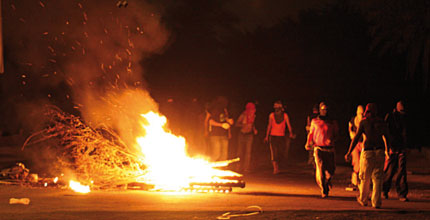
|
 |
 |
|
|
|
|
|
|
|
|
|
|
|
|
|
|
|
|
|
|
|
|
|
|
Effects of Riots on Human RightsThe outbreak of riots in several Bahraini villages in November 2009, signalled the beginning of a crisis created by extremist movements, such as the Freemen of Bahrain Movement, Haq Movement and the Bahrain Centre for Human Rights. These extremists seem unable to live in a peaceful and tolerant atmosphere and can only thrive if the security situation is tense as this provides an ideal backdrop for political opportunism. The extremists’ strategy relies on creating strife in the country which begins with the issuing of a large number of inciting statements, speeches and handouts encouraging children and youths to confront the security forces, set ablaze rubbish bins and tyres and vandalize public properties such as electricity generators. This leads to violent confrontations with the riot police coupled with the use of tear gas and attacking police cars with fire bombs. We have witnessed this scenario for years and as soon as the security situation calms, it starts up again in the same way. In November 2009, a policeman was seriously injured due to the use of fire bombs, and five youths have been accused of attempting to kill a security officer. On the other hand, a number of boys, teenagers and children were injured due the use of the ‘shozin’ weapon by the security forces. As usual, extremists were quick to issue statements which suggest that they are just human rights defenders. They also spread rumours in the foreign media that the detainees are merely a group of boys arrested during a ‘peaceful’ protest to demand democracy and respect for human rights, and they were victims of the state’s excessive use of force.
As we have witnessed in the past, the human rights cause has been used as a cover for calls to violence, confrontation and extremism where detainees suddenly become abused ‘human rights activists’. Human rights are in fact the real victim of the violence, which is likely to continue at least until mid December! This coincides with extremists’ celebration of Martyrs’ Eid just one day before the National Day: the peak time for rioting. Human rights have repeatedly been violated by a group that waves the flag of human rights. Freedom of expression is also a victim of violence. Although the freedom to assemble and protest is granted in Bahrain, advocates of violence are restricting it by engaging in street violence and breaching the law. In addition, residents of villages are suffering from the effects of smoke inside their houses and cannot enter or leave their areas freely. These residents are also victims of violence. These incidents came after a period of calm, and immediately after the Carzcan detainees were acquitted. However, as advocates of violence cannot live in an open, free and tolerant climate, they feel they must disturb it and continue with their violent activity. When people are killed, the Government and security forces are usually to blame, and when some are arrested, tens of statements are issued against the state’s alleged violation of human rights and its fabrication of accusations against them. If the Government pardons these rioters, extremists claim to have defeated the Government, and when one attempts to mediate in order to obtain a royal pardon for them, the response is that they want to be kept in prison and that it is none of our business, whilst at the same time they demand interference of Arab and international organisations and the issuing of condemnation statements. Because the scene of violence and rioting has become frequent in Bahrain, we would like to convey three messages to three groups in Bahrain: Firstly, to Arab and international human rights organizations: it is necessary to initially condemn all acts of violence and understand their background and political dimensions. Extremists have nothing to do with defending human rights, and their acts cannot be justified politically. This is especially true when a political process is currently in place and all political parties are prepearing for the next parliamentary elections. Some foreign organizations have previously issued statements based on wrong or inaccurate information. These organizations are required to reassess the situation, visit Bahrain and closely examine the situation and meet with all civil and political societies. Secondly, to local civil society organizations as well as political societies: remaining silent and not publicly condemning violence encourages advocates of violence to continue their actions and does not serve the interests of any political societies. These societies prefer not to be involved hoping that the Government will do what is required without the need for them to interfere. On the other hand, other societies feel helpless because they are unable to convince advocates of violence to stop. However, it is very important at present time that political societies issue a statement directed to the public, which openly condemns violence. This silence on the part of political parties prevents people from taking action against vandalism and destruction because they are waiting for direction from politically and religiously active parties. Thirdly, to the Government itself: we call on the Government not to use excessive force, live ammunition or shozin weapon when confronting protestors. In addition, the Government should deal with riots and those responsible for them in accordance with the law and those involved in violence and riots should be guaranteed a fair and public trial, and should not be granted amnesty, which might encourage others to continue rioting. |
